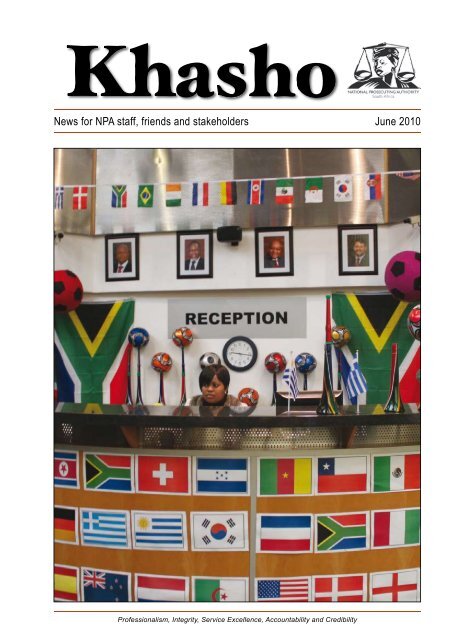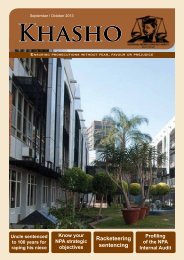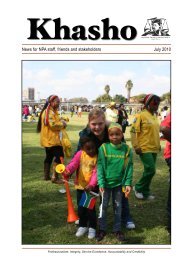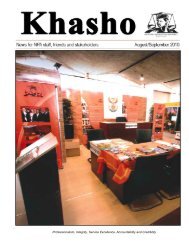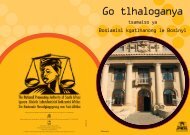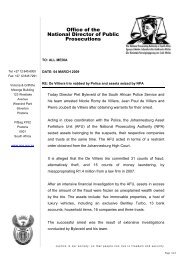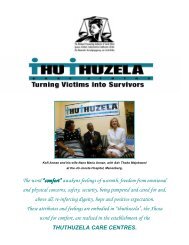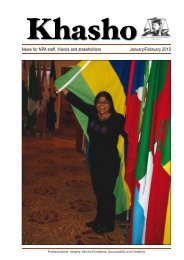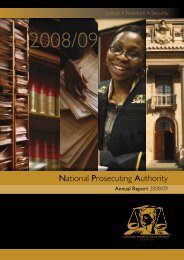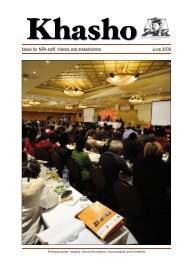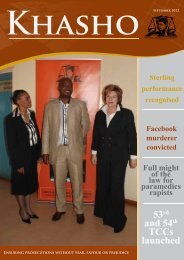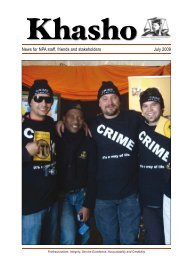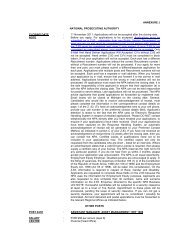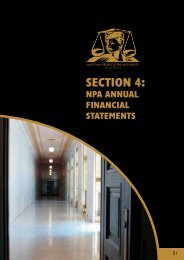Khasho June 2010 - National Prosecuting Authority
Khasho June 2010 - National Prosecuting Authority
Khasho June 2010 - National Prosecuting Authority
You also want an ePaper? Increase the reach of your titles
YUMPU automatically turns print PDFs into web optimized ePapers that Google loves.
News for NPA staff, friends and stakeholders <strong>June</strong> <strong>2010</strong>Professionalism, Integrity, Service Excellence, Accountability and Credibility
2 EditorialLetterfrom the EditorIt is a great pleasure to bring you yetanother edition of <strong>Khasho</strong>. The <strong>Khasho</strong>team strives to make the newslettera repository of valuable news andinformation about the NPA, its peopleand the service delivery initiatives that itembarks on with its partners.In this edition, we profile a component inthe office of the NDPP with the objectiveto learn more about the duties dischargedin this highest executive office of theNPA. This is more relevant in the contextof the realignment process of the NPAto better position it for more effectivedelivery of its mandate – conductingprosecutions on behalf of the State andany work incidental thereto. This shouldnot be confused with restructuring, whichwas put on hold for further review oncethe JCPS Cluster strategy is finalised.We also report on a positive developmentthat has led to a commitment betweenthe leadership of the NPA (NDPP) andlabour to bolster internal engagement andcommunication between the parties onpertinent matters in the NPA, by holdingregular meetings. This emerged at aBargaining Chamber meeting on 10 <strong>June</strong>,where the NDPP clarified the realignmentprocess. We also publish a shortenedversion of the background article thatbrings context to this realignment process.The NPA continues to shine in termsof its exhibition and eventing prowess.Our exhibition stand was once againawarded a gold medal at the annualRoyal Show in Pietermaritzburg in <strong>June</strong>this year. The work and efforts of alldedicated prosecutors and other staffmembers at the DPP KZN office at theexhibition stand did not go unnoticed. Igive an extra salute to Adv Ross Stuartfor his special contribution to the NPA’sparticipation at this key KZN eventthat attracts hundreds of thousands ofvisitors annually.The NPA also exhibited at the <strong>National</strong> ArtsFestival in Grahamstown, which took placefrom 20 <strong>June</strong> to 4 July.The dedicated <strong>2010</strong> World Cup Courtshave been a phenomenal success, and weapplaud the dedication of all those involvedin ensuring the successful operation andmanagement of these courts. These courtshave been a wonderful example of aneffective criminal justice system in action– the police, prosecutors, magistrates andother court officials have been amazing.It is clear that the success trend that hasbeen established in the administrationof justice will continue as planned untilthe end of the project on 28 July andhas been reported on widely in local andinternational media.Let us strive to sustain this positivity toensure that the wheels of justice are turnedswiftly and steadfastly without any fear,favour or prejudice.On a lighter note, South Africans have alot to be proud of after three weeks of agenerally incident-free <strong>2010</strong> Fifa WorldCup. We have witnessed colourful scenesof visitors enjoying our beautiful countryand fans having the time of their lives atour landmark stadiums.Bulelwa MakekeExecutive Manager: CommunicationsCover photograph: The NPA's colourful reception area showing national pride and support during the <strong>2010</strong> Fifa World Cup.Contents2Editorial8The <strong>2010</strong> IT Web Security Summit3NDPP in the media and the public domain10New Acting DPP for KwaZulu-Natal4Youth development11Field trip for Zululand prosecutors5An organisation under transformation12Congolese citizen forfeits luxury vehicle6The NPA's role in the World Cup13Life sentences for Monakato Boys7Outcome of PE legal aid attorney murder case16Tribute to late Senior State Adv Mpho MophatlaneProfessionalism, Integrity, Service Excellence, Accountability and Credibility
NDPP News3NDPP in the media and public domainThis article was originally published in the Crime Quarterly Journal on 10 <strong>June</strong> <strong>2010</strong>.The NDPP was interviewed by Iole Matthews for the Crime Quarterly Journal of the Institute ofSecurity Studies. Below is an edited extract from that interview:You are the fourth <strong>National</strong> Director of Public Prosecutionsthat the <strong>National</strong> <strong>Prosecuting</strong> <strong>Authority</strong> has had in the last 10years, if we include Acting NDPP Mokotedi Mpshe. Do youthink your vision differs from that of your predecessors?No, I don’t think so. I don’t think the vision for the NPA shoulddiffer from one NDPP to another. We might differ in termsof approaches and areas of emphasis, but, in the context ofgovernment work, and especially our cluster, it is quite clearwhat the <strong>National</strong> <strong>Prosecuting</strong> <strong>Authority</strong> is supposed to do.Its role is very straightforward. We do prosecutions and workincidental to prosecutions, such as investigations related to thoseprosecutions – so I don’t see that work changing unless thecriminal law changes. The vision, therefore, puts emphasis ondoing as many prosecutions as possible and ensuring success inas many prosecutions as possible. It is very difficult to imagineany other vision for the NPA under the present circumstances.When asked whether his role as NDPP has inappropriatelytaken centre stage, this is what he had to say:Absolutely. The NDPP has become this unbelievable individual.Where does that come from? It is because the media has notproperly reported on the institution as a whole, on the frameworkof the law, and how that works. We have lost an immenseopportunity to educate the public on how the prosecution serviceworks and its role in helping government transform society.Look at the Jub Jub case, for example. I did not even speak to anyof those guys prosecuting the case. It’s not my business. I onlyengaged with the acting DPP and while I might say, “this is how Isee things,” it is the DPP who talks to the prosecutors. Each DPP isindependent in his or her decision-making. While they definitelywork under my direction in terms of ensuring a common strategyand policy, in terms of decision-making they are independent.The <strong>National</strong> <strong>Prosecuting</strong> <strong>Authority</strong> Act specifies clearly underwhat circumstances I can overrule the DPP and what procedurehas to be followed. I cannot just go in and say I disagree withyou, so change your decision.These things are not really known by the public, largely becausemost of the time the attention and focus are on the NDPP – thepublic do not even know that the DPPs are independent.The instruction for senior prosecutors to be in lower courtshas met serious resistance in some quarters. What was thethinking behind this decision?Advocate Menzi Simelane,<strong>National</strong> Director of Public Prosecutions.It seemed unreasonable that a senior prosecutor with up to 20years or more experience does maybe two or three cases a year,while a junior prosecutor who has just graduated from universitydoes 20 cases a month. Even if those cases are more complex,logic should tell you that the more senior you are, the moreexperience you have, the quicker you can make decisions and themore value you can add.Also, prosecutions should never just be about court appearancesfor trials. Many cases can be dealt with administratively. Andrunning a court case is a skill, like surgery, so we should reservetrials for the more serious cases that deserve trials. In many casesone can get a plea and just deal with the case administratively butstill get the appropriate outcome. Now who is in a better positionto do this: someone experienced or someone less experienced?The more senior you are, the better you can negotiate and executethat responsibility, and if you are successful, you save court timeand reduce backlogs. Senior prosecutors do court work anyway– it is just the frequency that is in question. Many seniors alsosell themselves as specialists, for example, in sexual offences.Shouldn’t they then spend more time prosecuting in the courtswith the highest rates of sexual offence cases and guide juniorprosecutors?In closing, what about Menzi Simelane – the man – thatpeople don’t know about?I’m not as difficult as I look.THE NPA HOTLINE − 0800 212 580Building a culture of reporting unethical and unlawful practices, promoting and enabling whistle-blowing.Professionalism, Integrity, Service Excellence, Accountability and Credibility
4NPA NewsWorking together to develop theyouth through actionNomilo MpondoSouth Africa commemorated Youth Day on 16 <strong>June</strong> <strong>2010</strong>.This marked the 34 th Anniversary of the Soweto Uprising in1976. This commemoration took place within the context ofthe first anniversary of the establishment of the <strong>National</strong> YouthDevelopment Agency. The Youth Month programme waslaunched on 1 <strong>June</strong> <strong>2010</strong> to bring government services closer toyoung people throughout the month and beyond.Opportunities brought by democracy require the entiresociety to work together in improving the social conditionsof young people who still live in poverty and distress.• While all South Africans, irrespective of age, enjoy thehuman rights enshrined in the Constitution and Bill ofRights, young people have a responsibility to promote theirrights and defend our democracy.• Society should strengthen relationships within families tocreate a safe and caring environment where young peopleare able to have more positive and healthy lifestyles. Socialills and lack of access to basic social services impactnegatively on youth development.• Youth development in South Africa is everyone’sresponsibility, including that of young people themselves. Itis upon every young person to become an agent of change.Government is committed to continuously advance youthdevelopment• The <strong>National</strong> Youth Development Agency assists governmentin fulfilling its electoral mandate by, among others, the<strong>National</strong> Youth Service Programme, where 50 000 youthhave been targeted to establish cooperatives, as well asprofessionalism of youth work by ensuring that youth workersare trained by March 2011.• Since the launch of the agency, 7 593 loans have beendisbursed to microfinance enterprises to the value ofR23 million, and 4 224 business consultancy servicesvouchers to the value of R33 467 520 have been provided.• There are 121 operational offices, 113 of which are inpartnerships with municipalities to enable easy access to theproducts and services of the agency. For <strong>2010</strong>/11, the agencyplans to establish youth directorates in all municipalities andgovernment departments.In addition to the above, the NPA wants the youth to avoid beingin conflict with the law, and to live meaningful lives and becomeresponsible members of society. This cannot happen if they areinvolved in criminal activities. The NPA will therefore continuewith its efforts to educate young people about the criminaljustice system, and encourage them to stay away from crime.Nomilo MpondoMeet the newRegional Communications ManagersPhaladi Shuping joined the NPA in April <strong>2010</strong>. He isallocated to the DPP: Northern Cape, Kimberley office.He holds a Bachelor of Communications degree from OFSUniversity. He worked in the following organisations: ThabaNchu Youth Club as a public relations and events officer,the University of the Free State and Mangaung CorrectionalCentre (a private prison in Bloemfontein).Eric Ntabazalila joined the NPA in <strong>June</strong> <strong>2010</strong>. He is basedin the DPP: Western Cape office. He studied Journalismat the former Peninsula Technikon. He then practised as ajournalist for the Cape Times newspaper in Cape Town andlater worked as a media liaison officer for the Western CapeProvincial Government.The NPA looks forward to your positive contribution. Welcome to the family!Professionalism, Integrity, Service Excellence, Accountability and Credibility
NPA News5An organisation underAdv Thembi BurhalitransformationA narrative background to transformation in the NPAThis is a shortened and edited extract from a document prepared by Adv Thembi Burhali. For a fullcopy of this document, please visit the NPA intranet under “What’s new”.Envisioned by the Constitution, a single <strong>National</strong> <strong>Prosecuting</strong><strong>Authority</strong> (NPA) was created on 1 August 1998 under theleadership of the then <strong>National</strong> Director of Public Prosecutions,Mr Bulelani Ngcuka, to institute criminal proceedings onbehalf of the state and to carry out functions incidental to suchproceedings.However, it soon became clear that the organisation was operatingas a set of semi-independent individual units, which promptedMr Ngcuka in 2000 to embark on a strategic planning process toreview this state of affairs. Mr Ngcuka was convinced that theNPA needed to undergo transformation if the organisation was todeliver effectively on its mandate. This transformation entailedthe review and redesign of the organisational structure.Following the <strong>National</strong> Transformation Conference that washeld in 2004, followed by further mini-conferences at all NPAregional offices, the transformation process commenced inearnest in 2005 under the umbrella of the Serurubele project. In2006 a new strategic plan was adopted – the NPA Strategy 2020– and was formally launched at the NPA Stakeholder Conferencein March 2007.The NPA Strategy 2020 responded to the issues, challenges andservice requirements expected of the organisation to improve itsservice delivery. Following the finalisation of this coordinatedstrategy, the NPA deemed it necessary to review its structure togive effect to the need to improve service delivery. In addition tothis, the organisation needed to ensure that its various units werealigned to eliminate silos and the fragmentation of its services.In 2007, the next NDPP, Adv Vusi Pikoli, appointed a committeeto design the macrostructure of the organisation – an exercise thatwas followed by his successor, the Acting NDPP, Adv MokotediMpshe, in 2009.The committee proposed a macrostructure that supports theimplementation of the NPA Strategy 2020 and cluster processes.The structure sought to ensure that competencies are groupedtogether to ensure greater efficiency and encourage growthand learning. A key element of the proposed structure was thatprosecuting functions were to be housed in a single component.Specialisation was recognised to ensure that the NPA would beable to address certain crime focus areas that required specificskills due to the complexity, national interest or nature of thecrime. Various management structures were proposed to enhanceintegration in the organisation and reduce the impact of silos.Current StatusThe current NDPP took over the baton of service delivery on1 December 2009. When he was still the acting head of the<strong>National</strong> Prosecutions Service (NPS), he conducted visits tothe various regional jurisdictions to confirm the challengeshighlighted during the transformation process. He also attendedto similar challenges at head office.He embarked on the implementation of the macrostructure as itwas proposed by the review committee, and on a further reviewand realignment process to operationalise the macrostructure inline with the <strong>2010</strong>–2013 strategic plan. This realignment processdictated a reassignment of resources in order to position the NPAbetter so as to achieve its mandate as mentioned above. In terms ofthe NPA Act, this mandate is binding on all members of the NPA,from the most junior prosecutor to the most senior manager. (Tosee the current macrostructure, which was shared with organisedlabour on 18 May <strong>2010</strong>, please visit the intranet.)On 19 March <strong>2010</strong> a directive was given to the DPPs to commencewith realignment (not synonymous with redeployment). Therealignment does not change the employment status, nor the basicjob descriptions or employment benefits of the NPA members.On 10 <strong>June</strong> <strong>2010</strong>, the NDPP consulted with organised labour onthe transformation and realignment process. Labour did not objectto the process and expressed appreciation for the consultation andthe sharing of information.The macrostructure and the realignment process will becontinuously reviewed until the NPA is satisfied that they respondto the long-term objectives of the NPA Strategy 2020, in line withthe NPA Act and the Constitution.Adv Thembi Burhali: DDPP – NDPP Office: GovernanceComponent: LabourProfessionalism, Integrity, Service Excellence, Accountability and Credibility
6 NPA PerformanceThe NPA was always readyTebogo SeateSouth Africa has madehistory by being the firstAfrican country to host aFifa Soccer World Cup, andwe have shown the worldthat we can.Organising an event ofsuch a magnitude requiresmeticulous planning, andthat’s what the justice clusterhas been doing over the lastfew years.Plans were being put in placeto ensure that justice wouldbe effectively administeredduring the Soccer WorldCup. We knew very wellthat as people would becelebrating football and enjoying what our country has to offer,others would see it as an opportunity to commit crime – but wewould not allow them to turn the event into a crime festival.for the World CupWhen it was announced way back on 15 May 2004 that South Africa was going to host the <strong>2010</strong>Fifa Soccer World Cup, we were all overwhelmed by joy and thought it was a dream. But before weknew it, 11 <strong>June</strong> <strong>2010</strong> was here and the event was already taking place on our soil!NPA members gripped by the soccer fever during the "blow-your-vuvuzela moment" at the VGM on9 <strong>June</strong> <strong>2010</strong>.• 65 cases were either withdrawn or not enrolled.• 25 cases are still on investigation and 13 on trial.• Eight cases were partly heard and two warrants of arrest.A police force totalling 41 000 were deployed around stadiums,fan parks, hotels and tourist sites to combat all forms of crimeand to ensure the safety and security of everyone – locals andvisitors alike.Most importantly, 56 dedicated World Cup Courts were set upacross the country, with prosecutors, magistrates, detectives andinterpreters to ensure that criminals were caught, tried and sentencedas quickly as possible during the tournament. Impressiveresults were indeed recorded: of the 20 or so cases that were recordedin the first few days of the World Cup, the turnaroundtime has been astounding, and earned all high praise. Fans, tourists,players, support teams, volunteers and citizens in generalwere reported to be feeling more secure.At the time of going to press, we can report that the followingachievements were realised:• 56 dedicated Soccer World Cup Courts were fully and effectivelyoperating from 7 am to 11 pm.• 216 cases were dealt with, involving all forms of crime, rangingfrom theft to robbery.• 103 cases were successfully prosecuted and offenders wereeither fined or sent to jail.The NPA and its partners also launched the red card campaignagainst human trafficking before the World Cup started to educatecommunities about the existence of this form of crime.The NPA is proud that we were active participants during thishistoric event and not mere spectators. We ensured that justiceprevailed and offenders were punished.This achievement has not gone unnoticed, and some peopleare already calling for these dedicated courts to be used as atemplate for South Africa’s future justice system. Chief CrownProsecutor from the UK Police Delegation, Nick Hawkins, saidthe following to the NPA Administration of Justice Coordinator,Mr Nathi Mncube: "I cannot overstate how impressed I am withthe World Cup Project that you have led. I want to put on recordmy thanks for your help, Senior Public Prosecutor Fiona Cloete,DPP: Cape Town, and Senior Public Prosecutor Mzoxolo Qatana,DPP: Port Elizabeth. They all gave their time freely and I wasimpressed by their professionalism and common-sense approachto the World Cup."As a country, South Africa made its mark and left a legacy. TheNPA is also part of that legacy.Professionalism, Integrity, Service Excellence, Accountability and Credibility
NPA Performance 7Relief after the sentencing of accusedin the murder case of former legal aid attorney based in PETsepo NdwalazaThe Bisho High Court was filled to capacity by family, friends, relatives and members of thecommunity who had come to witness the sentencing of the men accused of murdering XolaniSoha, who worked as the legal aid attorney in Port Elizabeth before his death.Commentary byAdv Krishna JairamThe above is the kind of judgment that members of thecommunity want to hear. People are tired of violentand brutal crimes like this one and want to see justicedone. In this case, justice was indeed done, and thiswas confirmed by the tears of joy and smiles of reliefof family members of the deceased during the handingdown of judgment.Adv Krishna Jairam and Adv Jannie Coltman of the BishoDPP office.Thembela Nongongo and his co-accused were both sentencedto life imprisonment for murdering Xolani Soha. They alsoreceived three years each for the possession of an unlicensedfirearm and one year each for the possession of ammunition.It is alleged that the two accused approached the victim, whowas at Man’s Tavern, which is frequented by more affluentmembers of the Mdantsane community. On the pretext of beingtoo drunk to drive, they asked Mr Soha for a lift and he agreed.On the way, they asked the victim to drive to a secluded andpoorly lit area, wanting to “pick up a girlfriend”. They robbedthe victim and took him to a more secluded area in the veldand killed him. The body was concealed in the bushes and theydrove away in his car.Handing down the judgment, the Presiding Officer, JudgeSandi, said: “Society is sick and tired of criminals who have noregard for human life. I had considered carefully the evidencethat was given in court by both the defence and the state andI’m convinced that both the accused are a menace to society andthey deserve to be in jail for a very long time.”The judge also commended the hard work displayed bythe investigating officer in the case, together with stateadvocate Krishna Jairam, who also sighed with relief after thesentencing.The case took a year and a half to be finalised, due tothe amount of evidence that had to be led. I also tookover the case at short notice, but that did not deter mefrom wanting to see the case to its logical conclusion.A number of factors played a critical role in ensuringsuccessful prosecution, notably the MTN call datarecords of the deceased (a legal aid attorney). Thedeceased’s phone was recovered from a buyer whobought it from the accused. These records alsoconfirmed that the accused made several calls from thephone on the night Mr Soha was killed.Also, we initially had difficulty in establishing the timeof death of the deceased, but these records, along withweather reports, assisted the pathologist conducting thepost-mortem to narrow down the time of his death.The highlight of the case was when accused number 1contradicted himself consistently throughout crossexamination.His co-accused changed his versionentirely, claiming that his initial version was meant tooffer an alibi for accused number 1.From this case I have learnt two valuable lessons. First,no matter how much pressure you are experiencing as aprosecutor, you must always focus on the case you areworking on, and give it your utmost attention. Do notallow anything to distract you. Second, no matter howdifficult the case might be, always direct your energiestowards collecting all the evidence you need to build awinnable case.Professionalism, Integrity, Service Excellence, Accountability and Credibility
8NPA PerformanceAdv Paul Louw addressing theNomilo Mpondo <strong>2010</strong> IT Web Security SummitHeld during 11–13 May, Senior Deputy Director of Public Prosecutions, Adv Paul Louw, attendedthe <strong>2010</strong> IT Web Security Summit at the Sandton Convention Centre. The summit brought togetherleading international and local security experts and industry innovators, as well as a blue-chipaudience of IT and security professionals. In a bid to unleash untapped talent in the NPA, <strong>Khasho</strong>speaks to this cybercrime expert.How big is the scourge of cybercrime in the country andwhich segment of the population is most at risk?Criminal organisations are more flexible thanks to the internet.They have several links at international level and they exploitthe internet as a networking tool.Adv Paul Louw (centre) with Adv Mamabolo and ColonelMabusela.You are a prosecutor and a cybercrime specialist. How didthis come about?The term “cybercrime specialist” is misleading. I am inagreement with Michel Quille, Director of Europol, whoargues that there is no so-called ‘expert in cybercrime’.Cybercrime expertise gets outdated in a very short timeunless a regular update is guaranteed.My own involvement dates back to 2002, when we realised thattransnational organised crime groups assumed the corporateidentities of South African government departments andcorporations in order to defraud victims. Back then, “websiteimpersonation” was a real problem. Perpetrators createdwebsites as a vehicle for criminal activities that appeared tobe legitimate. Unsuspecting victims were referred to thesewebsites and they believed that they were dealing with thereal McCoy.Since 2004, the cybercrime onslaught against the SouthAfrican banking industry gained momentum both insophistication and incidence. I was approached by Mr PatPather of Standard Bank to assist. We formed a strongpartnership and we have always endeavoured to protect thecorporate identity of our banking industry, including theSouth African Reserve Bank.The present crime threat in South Africa can be described as aserious economic offence. The amounts lost by individuals,businesses and banks during 2009 and <strong>2010</strong> are staggering. Onthe one hand, perpetrators target government departments, metrocouncils and/or the so-called “business-on-line clients”, but on theother hand, the threat of phishing (password harvesting fishing)proves to be a huge problem. The problem with cybercrime isthat it is a faceless problem. Cybercrooks use technology to stayanonymous and they cover their tracks fairly easily.The cybercrime threat in South Africa may become evengloomier than the realm of serious economic offences. SouthAfrica has, for example, not yet experienced a serious “denialof-service”attack, as was the case in a country such as Estonia.In my view, South African law enforcement should be proactiveand anticipate the possibility of an organised “denial-of-serviceattack” (this is where a legitimate user is denied access to ITinfrastructure by the hackers) on the infrastructure of SouthAfrica. Law enforcement should be proactively organised andin a position to immediately deal with such a crime threat. Wesimply must protect South Africa’s digital assets.Can you take us through the success rate of cybercrimeprosecutions?I believe that prevention is the best cure. Despite shortcomings,South African law enforcement agencies have enjoyed somesuccess. In just four investigations, law enforcement hasprevented losses of some R140 million. In two of these cases,R43 million had already been transferred from victims’ accountsto bank accounts controlled by the fraudsters. The perpetratorshad unlawfully accessed the bank accounts of a governmentdepartment and a company. In both cases corrupt bank officialsassisted the perpetrators.In the two other matters, investigators discovered that criminalshad already been in possession of sensitive personal informationProfessionalism, Integrity, Service Excellence, Accountability and Credibility
Staff News9of two other business accounts, with an exposure of almostR100 million. The relevant banks were warned in time. Thebanks were then in a position to safeguard their clients’ funds.According to the US Attorney Robert Strang, law enforcementis increasingly turning to proactive investigations whereundercover agents seek out the individuals who are alreadyengaging in computer crimes – attempting to record computercriminals while they are involved in the criminal act. Theproactive approach bypasses some of the investigatory hurdlesof anonymity, lack of records and under-reporting inherent incomputer cases. It also has the added benefit of potentiallystopping the criminal before the damage is done.South Africa's law enforcement agencies have also succeededin some cases to identify the cybercrook. In one textbook case,the cybercrook was arrested in the act behind the computer. Inother cases, the computer was found in the possession of thesuspects. It is often not a problem to link the computer to thecrime, but to link the suspect to the computer. In these cases,suspects rely on the so-called “multiple user” defence and thestate’s case is based on circumstantial evidence.During the summit, you emphasised training for lawenforcement officers in this field. What gains will trainingbring about in the fight against cybercrime?In cyberspace, ignorance is not bliss. The reality is thatdigital evidence will in future form part of most crime scenes.However, this kind of evidence is often highly volatile and easilycompromised by poor handling. The law enforcement officialContinued on p 11Focusing on matters of public interestSibongile MogaleA new component has been established in the NDPP’s office, called the Public Interest Division.<strong>Khasho</strong> went to speak to Adv Mpho Doubada, head of the division, to find out more about thisnew formation.Public Interest Division: From left: Adv Chuma Mtengwane, MariaMutshivhana (Personal Assistant) and Adv Dania Bruwer.Standing from left: Adv Mpho Doubada (DDPP/Coordinator) andAdv Nduvheni Mulangaphuma.When and why was this division formed?The division was formed in December 2009 in order to enablethe NPA to put emphasis on issues that are of interest to thepublic. As the name suggests, our stakeholders are membersof the public.How many members form this division?We are a division of six members, consisting of me ashead/coordinator, Adv Nkomu Mabaso, Adv TerrenceMulangaphuma, Adv Chuma Mtengwane, Adv Dania Bruwerand Ms Maria Mutshivhana.By establishing such a component, what doesthe NPA aim to achieve?In establishing this division, the NDPP’s concernwas that the NPA has not been giving specialattention to matters of public interest. Someof the matters of public interest identified bythe division include the hijacking of buildings,illegal mining, environmental matters (suchas dumping), occupational health and safetymatters, labour-related matters and road andtransportation matters. Since our establishment,we have already dealt with a number of problemssuch as the hijacking of buildings, especially inJohannesburg.Typically, what do you do on a daily basis?I read newspapers to check for cases that are ofpublic interest, and then allocate them to relevantteam members. I also have to continuously liaisewith my team to check their daily progress anddistribute work to them. In addition, I have toliaise with different stakeholders on a continuousbasis.What are the challenges facing this new component?We are still a new division, and we need to reach out to asmany members of the public as possible. Because we are new,we are still trying to find our feet. Another critical challengeis to get the full cooperation of our various stakeholders,because we definitely need their assistance.<strong>Khasho</strong> wishes the team all the best in their endeavours, andvery soon we’ll be reporting on their achievements.Professionalism, Integrity, Service Excellence, Accountability and Credibility
10NPA StaffMeet Adv CS MlotshwaNatasha Ramkisson - Acting DPP for KwaZulu-NatalAdvocate CS Mlotshwa was appointed as Acting DPP for KwaZulu-Natal on 21 May <strong>2010</strong>. <strong>Khasho</strong>took a few minutes to find out how he is finding his new challenges.What has been yourexperience so far as anActing DPP?In brief, it has really beenchallenging and demanding.The vacancy rate also presents itself as a challenge. Experiencedprosecutors from the high court are working in the lower courts,where experience is a serious challenge. My other challenge is tomove people out of their comfort zones, especially those who areresistant to change.Acting Director of PublicProsecutions: Adv CS MlotshwaNew Acting DPP supports trainingCharlene LabuschagneWhat challenges do youtypically face as an ActingDPP?As a deputy, I was onlymanaging six advocates, butnow I am managing approximately551 employees in theregion.I am a very hands-on managerand I believe in going the extra mile in whatever I do. Immediatelyafter my appointment as an ADPP, I had meetings with control,senior public and chief prosecutors in all six clusters in the regionsas well as members of senior management and the judiciary in thelower courts and high courts. As an Acting DPP, I have to attendnumerous meetings with stakeholders. It is a big challenge, as I haveto develop a skill of managing a huge amount of information.Do you find your job fulfilling?Yes indeed. I find my job interesting and stimulating, as I now haveto deal with people from all walks of life.Do you have any message of encouragement for the rest of theorganisation?Every member of the organisation ought to be acutely aware thatthe NPA does not exist in a vacuum – it operates in an environmentthat is constantly changing politically, economically, socially,technologically and legally, and therefore we must be flexibleenough to adapt to change quickly. In that manner, the NPA will beable to keep its head above water even during times of volatility.In a nutshell, there should not be a situation where people stilldemonstrate resistance towards transformation. It is disturbing andnot ideal for the organisation that we still have members who areaverse to change and transformation sixteen years after the adventof the new dispensation.on sexual offences legislationOn 17 December 2007, the Criminal Law (Sexual Offences and Related Matters) AmendmentAct, 2007 (Act No 32 of 2007) became effective.This Act repealed two common law offences, namely rapeand indecent assault. Both offences of rape and sexual assault,as created in terms of the new Act, is gender-unspecific. TheAct broadened the definition of penetration and violation toalso include all forms of sexual penetration and violationwithout consent. It further created new statutory offencesrelating to certain compelled acts of penetration or violation.It criminalises the compelled witnessing of sexual conductand/or the exposure of certain parts of the human anatomyand/or the watching of child pornography by an adult orchild.Section 66 of the Act requires the issuing of nationalinstructions and directives to be followed by law enforcementagencies, the <strong>National</strong> <strong>Prosecuting</strong> <strong>Authority</strong>, and health carepractitioners.Advocate Xolisile Khanyile, Acting Director of PublicProsecutions: South Gauteng, organised a training sessionon chapter 2 of the Act for all the district and regional courtprosecutors of the Johannesburg Magistrate’s Court, whoregularly prosecute sexual offence cases. The training willensure that the requirements of section 66 of the Act, readwith the directives published by the Department of Justice,are adhered to when prosecuting sexual offences and allrelated matters.Approximately 12 district court prosecutors and 15 regionalcourt prosecutors were trained by the Senior Prosecutor,Ms Carina Coetzee, in May <strong>2010</strong>. Specific emphasis wasplaced on the definitions, mind maps and directives. Theprosecutors were also supplied with case law relating to newoffences that had been created by the new Act.Professionalism, Integrity, Service Excellence, Accountability and Credibility
NPA News11Field trip for Zululand prosecutorsNatasha RamkissonIn early May, Adv Ross Stuart and Adv Dalene Barnard from the Director of Public Prosecutions(DPP) office in Pietermaritzburg accompanied a group of Zululand prosecutors on an on-siteenvironmental training session at the iSimangaliso World Heritage Site in KwaZulu-Natal.of wildlife. We were accompanied by KZN Wildlife officialswho taught us of the enormous problems caused by poachingand the terrible damage caused by the setting of snares.”Through their interaction with KZN Wildlife officials, theprosecutors will now lead evidence in aggravation of sentencein appropriate cases, as the records show that suspendedsentences have been the norm and have served no deterrentpurpose.The impression that was gained from all the participants was thatthe exercise was well worth the effort. KZN Wildlife officialssuggested that the exercise be repeated regularly, so that allprosecutors in the area could benefit from the experience.Zululand prosecutors accompanied by members of the DPP officein Pietermaritzburg.Due to its diverse beauty, this 332 000 hectare park was listedas South Africa’s first World Heritage Site in 1999.The prosecutors visited the uMkhuze Game Reserve inparticular, where they saw wild dogs and cheetahs at closequarters, as well as the ‘usual’ sightings of antelope, giraffe,warthogs etc. According to Adv Stuart, “The knowledge levelsof those who attended varied from one who did not recognisean impala, to others with a keen interest and fair knowledgeSaid Advocate Stuart: “All participants were provided withan Enviro Prosecutor’s Toolkit, consisting of a CD containingcharge sheets, and the relevant legislation and other materialthat we had put together for them. Copies of the CD are nowbeing made for distribution to all concerned with dealing withwildlife crime in the area.”"iSimangaliso must be the only place on the globe where theoldest land mammal (the rhinoceros) and the world’s biggestterrestrial mammal (the elephant) share an ecosystem with theworld’s oldest fish (the coelacanth) and the world’s biggestmarine mammal (the whale)." – Nelson Mandela.Continued from p 9who arrives first on the crime scene has a huge responsibility,and the conduct of this official will be placed under scrutinyat a later stage. The chances of success in litigation orsuccessful criminal prosecution by law enforcement agenciesdepend heavily on the availability of strong evidence.It is of utmost importance that every law enforcementofficer knows how to gather and seize electronic evidencein such a way that the integrity of this evidence is protected.Mistakes made at a very early stage of the investigation maycompromise a prosecution. I often refer law enforcementofficers to best practices employed in other countries, such asthe Good Practice Guide of the United Kingdom's Associationof Chief Police Officers (ACPO) or the recommendation ofthe International Organisation on Computer Evidence. Weneed a South African version of these best practices andevery police official (including the metro police) shouldreceive training. There is also a need for more trained expertsto analyse and to testify about seized digital evidence.What sort of evidence does the court require to prove thatcybercrime has been committed and how difficult is it toobtain it?I have already referred to the nature of electronic evidence andthe problems associated with it. But there is no replacementfor good, old-fashioned detective work.What advice do you have for fellow NPA employees?We are all in the process of learning and we should help eachother. It reminds me a lot of the period 1994–1996, when theimpact of the Bill of Rights had a huge impact on the dailyactivities of the prosecution service. There were not manyprecedents we could rely on. We collected case law fromall over the country, researched the topics and assisted eachother with arguments in court. The same should happen here.The Global Prosecutors E-crime Network (GPEN) initiativeshould be supported. Feel free to contact me. I will probablynot have the answer immediately, but will assist you with thehelp of GPEN.Professionalism, Integrity, Service Excellence, Accountability and Credibility
12NPA PerformanceCongolese citizen forfeitsAdv Charl Geel luxury vehicle to the stateSenior Advocate Charl Geel of the Johannesburg office of the Asset Forfeiture Unit succeededin bringing an application for the forfeiture of a 2006 Audi cabriolet worth approximatelyR300 000 in <strong>June</strong> <strong>2010</strong>. The Audi belonged to Ludovic Kayembe Mutombo, a Congolese citizen.It is believed that Mutombo is part of a syndicate that steals money from unsuspecting peopleby providing banks with fraudulent documentation to access funds illegally.On 13 December 2007, members of the South African Mr Mutombo is accused of intercepting post from peoplePolice Service searched the residence of Mutombo. At holding foreign bank accounts with the purpose of obtainingpersonal particulars of potential victims. The syndicatethe time of the search, he was residing in a townhouse complexin Bryanston, Johannesburg. The police found numerousdocuments and items at his place of residence. These name of these victims. The syndicate proceeded to write, faxseemed to have created false identity documentation in theincluded money grams, bank cards, personal documents, or phone the victim’s bank and pretended to be the victim.fraudulent passports, various other documents such as bank They requested the bank to transfer money from the victim’sstatements and personal tax returns, as well as application account to another account opened by them at another bankforms for identity documents. The search also resulted in in another country. The money would either be withdrawnthe discovery of a number of written requests for the unlawfultransfer of funds from bank accounts belonging to un-accounts.or transferred via money grams to other South African banksuspecting persons to other target bank accounts. The targetbank accounts seemed to have been opened on a fraudulent Mr Mutombo is facing charges relating to theft, fraudbasis in, inter alia, Cambodia, Vietnam, China, Thailand, and forgery in the Specialised Commercial Crime Court,Spain, Indonesia, Hong Kong and South Africa.Johannesburg. <strong>Khasho</strong> will keep track of the developmentsof this case.Amidst the hype of the FIFA World Cup,annual happenings went on as usualNatasha RamkissonOne in point was the Royal Show in Pietermaritzburg. Locals and tourists alike descended uponKwaZulu-Natal’s (KZN) capital city to visit the show, which took place before the start of the WorldCup and during the Comrades Marathon.The <strong>National</strong> <strong>Prosecuting</strong> <strong>Authority</strong> (NPA) was once againa participant in this prestigious event, and we exhibitedtogether with other government departments such as theSouth African Police Service (SAPS), and the departmentsof Correctional Services (DCS), Justice and ConstitutionalDevelopment (DoJCD), Trade and Industry (DTI), and SocialDevelopment (DSD).Various activities were planned to entertain and inform visitorsand learners from various schools that visited the show. On29 May, a demonstration was held by volunteers of the KZNHuman Trafficking, Child Pornography, Prostitution andBrothels (HPPB) Task Team to create awareness around humantrafficking. This exhibition drew many spectators who showeda keen interest in learning more about human trafficking and theNPA’s efforts to curb this scourge.Edutainment in the form of stage plays were put on during theweekdays for the learners. This was a joint initiative betweenthe NPA, DCS and DSD.On 2 <strong>June</strong>, a play showing how a person gets trafficked was puton by other members of the HPPB (including NPA personnel). Ittaught learners how not to fall prey to traffickers, and provideda helpline number. On 3 <strong>June</strong> court preparation officers fromthe different courts in KZN put on a play entitled Busi goes tocourt. This showcased the role of the court preparation officersin ensuring the wellbeing of victims.The NPA exhibition stall was lauded and presented with a goldmedal for the appearance of the stand. According to the RoyalShow Society, this year’s show was deemed as a great success,and 121 000 visitors attended.Professionalism, Integrity, Service Excellence, Accountability and Credibility
NPA Performance13Two life sentences for Monakato BoysFrank LesenyegoSpeaking to <strong>Khasho</strong>, Inspector Kgekoane, the SAPS investigating officer, praised theenthusiasm and determination of the witnesses. The witnesses were determined despitenumerous postponements. He said they played a crucial role in the conviction of BoitumeloCaleb Moloto (23) and Kgomotso Naphtally Phutsoane (24). He further said the cooperationbetween Investigations (South African Police Service) and Prosecutions was key to the accusedpleading guilty during their confession at the beginning of the trial.During the trial, it was revealed that on 19 July 2009 at about8:00 in the evening, the deceased, Shimane Isaac Mafoko,was driving around Monakato Location in his vehicle, lookingfor his nephew. The deceased met the accused, who boardedhis vehicle and showed him where his nephew resided. Theywent to look for the nephew and on their way they bought twobottles of alcohol, which were consumed by the accused.They then drove with the accused to Ceramic Tavern atMogwase. After a while, they left the tavern, and that is whenthey decided to rob the deceased. The deceased was kept in theboot of the car. At Pretoria Road they let him out of the boot.They then used a huge rock and hit him on his forehead, afterwhich they put him in the boot again.As they approached the road to Boitekong, they abandonedthe car. They stopped a SAPS vehicle, alleging that they werehijacked by an unknown man. The police took them home toallow the accused to open a case of hijacking.The next morning, the police approached one of the accusedand informed him that they recovered a car with a deadperson in the boot of the car. The accused confessed to themurder and also implicated his friend. They were arrested on21 July 2009 and appeared before a magistrate and made aconfession voluntarily. Both men were given life sentencesand 15 years for robbery after they were found guilty for themurder of Mafoko in the Rustenburg Circuit Court beforeJudge Gura. Advocate Utlwang Mokone indicated that thetrial went as swiftly as possible. It took less than a year for theaccused to be convicted and sentenced. They were arrested inJuly 2009 and sentenced in February <strong>2010</strong>.Mamelodi TCC goes all outLida van Schalkwyk to support Child Protection WeekTowards the end of May <strong>2010</strong>, and prior to the kick-offof the Fifa Soccer World Cup in <strong>June</strong>, the MamelodiThuthuzela Care Centre (TCC) ran a number of campaignsfor schoolchildren in Mamelodi to raise awareness about childabuse and child trafficking.TCC, utilised the opportunity to educate everybody about courtprocedures and the protection offered to children attendingcourt. After all the formalities, the learners were entertained bythe Tshwane SAPS Band, and the learners from the school gavedrama and music performances on the effects of abuse.These campaigns were a combined effort of the MamelodiTCC personnel, who made sure they visited various schoolsthroughout Mamelodi to educate learners about child safety andabuse, as well as to encourage them to report all cases of childabuse and neglect to their parents, teachers or social workers.Learners were also warned about the dangers of child traffickingand to be extremely cautious when strangers approach themwith all kinds all promises.On 26 May, the group visited Tshimollo Primary School, whereMs Nomsa Dombo, the site coordinator for Mamelodi TCC,spoke about the services rendered at the centre, which caters forall victims of gender-based violence.Ms Lida van Schalkwyk, the case manager for the MamelodiChildren from Mamelodi attending Child Protection Week activities.Professionalism, Integrity, Service Excellence, Accountability and Credibility
14 NPA StaffComrades marathon <strong>2010</strong>Nomilo MpondoDoes it ever occur to you that behind those court robes there are ordinary men and women that dowhat ordinary folks do? <strong>Khasho</strong> unveils the mask donned by these court fanatics. Yes, they canbreathe, eat and laugh – and they can run too. The Comrades Marathon on 30 May in Pietermaritzburgwas an event where some NPA men and women showed their mettle outside the court room. Thefollowing is what they had to say about the race:DDPP: South Gauteng Office, Adv SelloMaemaAdv Anthea van der BeylAdvanced Manager: SRM, Mr TshinyadzoMudauAdv Sello Maema, DDPP: South Gauteng Office: I startedmy preparation in November by taking part in the prestigiousSoweto Marathon. I run every weekend, and I train throughoutthe year. I participate in at least four ultramarathons (50 km)before the Comrades Marathon. This year’s Comrades was myfifth and I did it in 8:50, my personal best time. The sport isvery expensive – I go through a number of running shoes duringtraining. Other expenses include travelling to the races, entrancefees for the races, and dietary supplements. A lot of disciplineis required, as you have to wake up early in the mornings fortraining and for the races. However, the benefits of physicalfitness and health are enormous.Adv Allen Simpson, DPP KZN Office: I ran and finished my13 th Comrades this year and completed it in 9:15:41. In short,the Comrades is a life-changing event. Although the time topractice seems to be less nowadays, it is still a great event tolook forward to every year. Running the Comrades has blessedme in so many ways. Everyone should run the Comrades at leastonce in their lives. Take small steps; start with 10 minutes ofwalking every second day. As they say, the rest will be history.Adv Anthea van der Beyl, NDPP Office: Organised CrimeDivision: I ran my very first 5 km on 5 September 2009. Twoweeks later I ran my first 10 km! I pursued my first marathon inPort Elizabeth under heavy west-southwest winds. My finishingtime of 4:14 qualified me for the Two Oceans and Comradesultramarathons. All the early risings for training and raceseventually made sense when I lined up with about 20 000 runnersfor the Comrades on 30 May <strong>2010</strong>. I crossed the finishing line in11:14 with one tekkie, blisters like bubbles and a missing toe-nail!The feeling of achievement is definitely worth the pain. Runningis a joy and once that bug bites, you will never get rid of the fever.Advanced Manager: Security Risk Management (SRM),Tshinyadzo Mudau: I started running marathons inOctober 2009, and since then I have never looked back becauseI am a person who is driven by my own goals. This year Iparticipated in the Comrades Marathon and got a bronze medal,with a running time of 10 hours and 52 minutes. In all this,I thank God, my family, Moses Letlhaku, who is my trainer,and my sponsor ESKOM. This medal is for SRM and all NPAofficials, but I will keep it for security's sake!By the time <strong>Khasho</strong> went to press, Acting DPP KZN,Adv Mlotshwa, was still recuperating from the marathon.Congratulations to all other NPA members who took part inthe Comrades Marathon.Professionalism, Integrity, Service Excellence, Accountability and Credibility
NPA Performance15Life sentencesfor the cemetery killersThree of the four ABC Cemetery killers were sentenced to life imprisonment for the brutal murderof a 25-year-old woman. The minor accused was given 15 years in jail.Phaladi ShupingAdv Tania Birch, DPP KimberleyThe four men who attacked and killed25-year-old Ngugu Letty Wapadat the ABC Cemetery in Galeshewe,Kimberley, were sentenced to lengthysentences by the Northern Cape HighCourt on 25 May <strong>2010</strong>. Wapad wasgang-raped and murdered in what wasdescribed as one of the most gruesomemurders in the Northern Cape’s history.The Northern Cape High Court ActingJudge, GNZ Mjali, sentenced thebrothers Archibald Itumeleng Chweu,26, and Moleko Chweu, 21, as wellas Thabiso Majama, 20, to three lifesentences each and another 10 yearsimprisonment for the violation of thecorpse. The life sentences for rape,murder, indecent assault and the 10-year sentence for violation of the corpsewill run concurrently.The minor received a 15-year sentencefor rape, murder and indecent assault,and another eight years for violation ofthe corpse. The sentences will also runconcurrently.The four men gang-raped and brutallymurdered Wapad during the night of28 March last year. Her mutilatedbody was found hours later in the ABCCemetery under a pepper tree. She wasstabbed 16 times before her attackersshoved a stone into her genitals. Shewas cut open from the chest to the lowerabdomen, and some of her internalorgans were removed, strung out andhung over a tombstone.State Advocate Tania Birch calledforensic pathologist Dr Denise Lourensto testify. She testified that the rape andmurder of Wapad was the most gruesomecase in her career of more than 10 000autopsies. She stated that the deceasedsuffered multiple stab wounds of whichfour were in the chest area.She stated during the cross-examinationshe had never seen a case involving somuch violence and trauma. “The extentof the deceased’s injuries falls into theworst category I have ever experiencedin my career of 16 years.”Acting Judge Mjali described Wapad’sdeath as “one of the most revoltingways of killing a human being.”She said: “Serious violent crimes arerife in Kimberley and should not onlybe deplored, but also severely punished.The sentence must send a deterrentmessage to stem the escalating tide ofviolence.”The mother of the deceased, SannaWapad, said she was happy with thesentences. “I will never see my childagain but I have peace. I look forwardto a good night's sleep,” she said.Commentary by Advocate Tania BirchWe managed to prove our case beyond reasonable doubtbecause it was a team effort. The quick response ofthe police was a breakthrough to a certain degree. Theyfound bloody pants of accused number three, who claimedthat he had consensual sex with the deceased and theblood on his pants was as a result of her menstruation.However, the autopsy confirmed that the deceased was notmenstruating at the time of her death.The other challenge we had was having accused numbertwo’s mother as a witness. It can never be easy to testifyagainst your own son. I called her to my office and sheconfessed that during one of her visits to the prison her sonconfessed that he also raped and stabbed the deceased. I thenrequested for a second statement to be taken from her.The other difficulty we encountered with accused numberfour was getting his friends to testify, as he told them aboutthe rape and murder before he was arrested. They werenot willing to testify, but we eventually convinced themto testify. It was not easy for them to testify against theirchildhood friend. However, it was not about friendshipbut about ensuring that justice is served. And indeed itwas served.Professionalism, Integrity, Service Excellence, Accountability and Credibility
16 NPA StaffAdv Kholeka Gcaleka: Chairperson of the Society of State Advocates of South AfricaTribute to the late Senior State AdvocateMpho MophatlaneBelow is a shortened and edited version of a tribute paid by Adv Kholeka Gcaleka to late SeniorState Advocate Mpho Mophatlane, who was laid to rest on 27 <strong>June</strong> <strong>2010</strong>.would like to honour and pay tribute to one of our own. II say one of our own, because Mpho was our colleague andpart of the NPA and Society of State Advocates. He was part ofthe successes and challenges of these organisations. Mpho wasprepared to travel the difficult and long journey to build a trulyrepresentative and professional prosecutorial service and justicesystem for our country. This journey is part of the broader goalto build a non-racial, non-sexist, united, democratic and justSouth Africa. He was prepared to practice and defend the valuesand principles espoused in our Constitution. These values arethe bedrock of our justice system.It will not be an exaggeration to say the icy and cruel handof death has robbed us and the broader South African justicesystem of Mpho’s legal mind and contribution to the noblecourse of justice and the rule of law. Through his profession,Mpho was daily serving and defending the people of SouthAfrica, particularly victims of crime. In his own way, he wasfollowing in the footsteps of great South Africans like JusticeMohamed, Advocate Bram Fischer and human rights lawyersMr Griffiths and Mrs Victoria Mxenge. I mention these fewSouth Africans because they came from typical separatedSouth African communities, but were united by their love oftheir country and abhorrence of all forms of discrimination andinjustice.Our country comes from a painful history and legacy of legaland administrative discrimination. As ‘people's lawyers’, wehave a responsibility to be part of the movement to reverse thislegacy. The passing on of Mpho affords us an opportunity tostand back and reflect whether we are practising the principlesand policies of the NPA and our noble profession. In memoryof Mpho, we have to be counted in the frontline of defenders ofour Constitution, which is the supreme law of the Republic.Wehave to do so because we are enjoined by the Constitution.Let me close by quoting the wise words of Pierre Magnan in theMessengers of Death, where he says: “When a house has justThe late Senior State Advocate Mpho Mophatlane, DPP: SouthGauteng.lost its soul, a stricken silence falls over the sudden emptinessthat no one will fill again. And all the noises that may be madelater in that house will be like a scandalous din, ugly echoesfrom one room to another, from one corridor to another, sharpand discordant as if the walls are no longer able to absorb anymusic once the source of harmony has been taken away. Butthis strange detail about the power of death can only be pickedup by ears that are very attentive to the smallest murmurs oflife. Rational people go through these empty spaces with theserenity of a lawyer, and their indulgent smiles categorise you ifyou decide to point out in their presence that there is somethinglacking in the atmosphere.”We say farewell to our dear friend and colleague.Lala Ngoxolo. Robala Hantle, Mphoza.Professionalism, Integrity, Service Excellence, Accountability and Credibility


